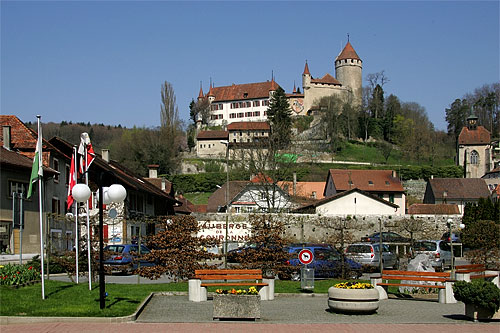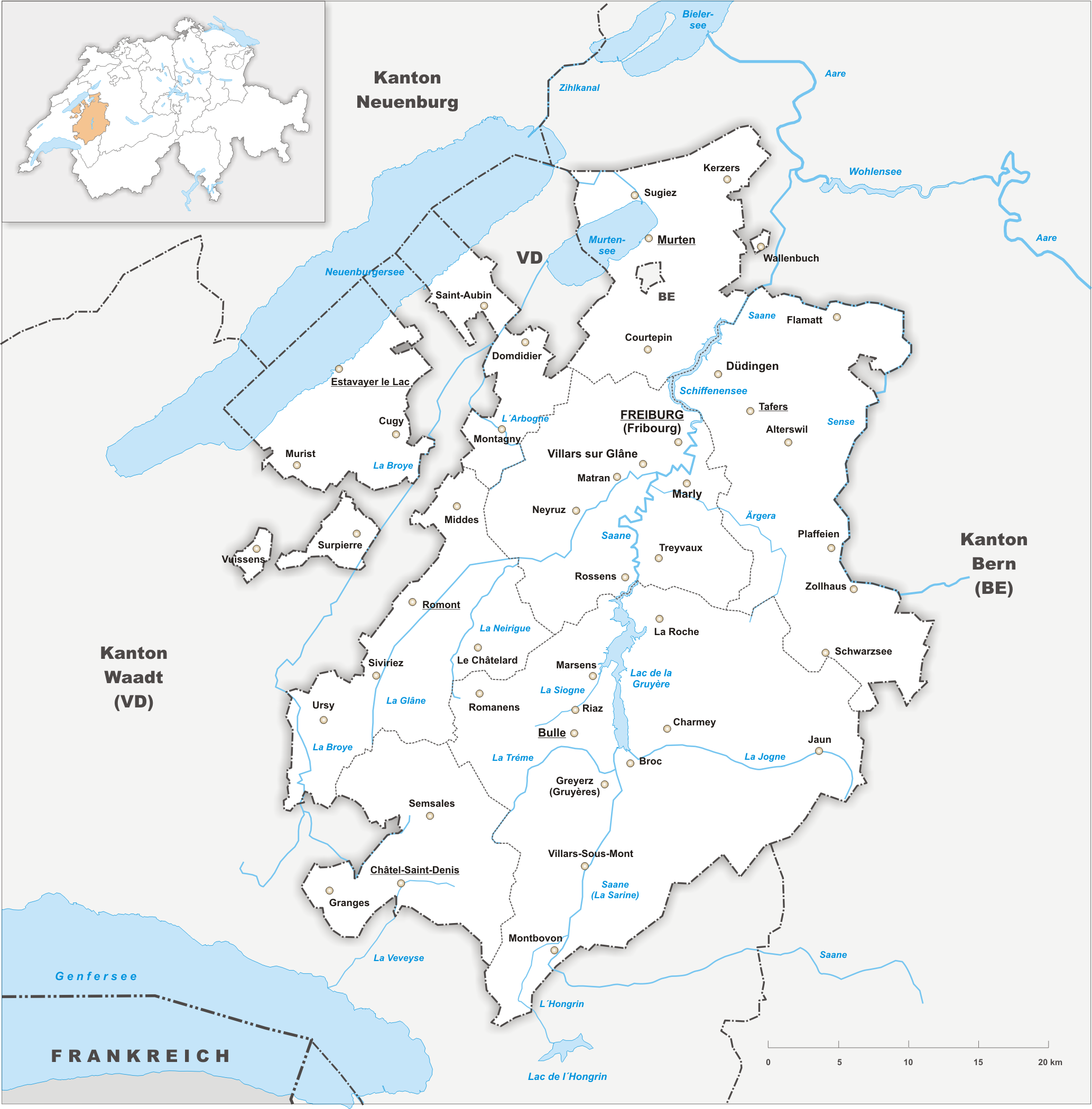|
Lucens Castle
Lucens Castle is a castle in the municipality of Lucens in the canton of Vaud in Switzerland. It is a Swiss heritage site of national significance. History The castle's strategic location allowed it to control the Broye valley, which was an important transit corridor. Starting in the Middle Ages and until 1536 it was a residence of the Bishop of Lausanne and served to control the bishop's land in the Broye valley. During the 12th century, the castle was repeatedly destroyed and rebuilt. In 1476, it was destroyed by the Swiss Confederation. In 1536 the valley and the surrounding territory were conquered by Bern. It became the seat of a Bernese bailiwick at the same time. In 1542, the vogt of Moudon moved into the castle. It was enlarged between 1579 and 1586 and served as an arsenal and fortress on the border to Fribourg. In 1798, the Bernese were forced out and the Canton of Léman was formed. Shortly thereafter, the castle became the property of Canton, who sold it ... [...More Info...] [...Related Items...] OR: [Wikipedia] [Google] [Baidu] |
Lucens
Lucens () is a municipalities of Switzerland, municipality in the Broye-Vully District, Broye-Vully district in the Cantons of Switzerland, canton of Vaud in Switzerland. In 2017 the former municipalities of Brenles, Chesalles-sur-Moudon, Cremin, Forel-sur-Lucens and Sarzens merged into the municipality of Lucens. History Lucens is first mentioned in 964 as ''in villa Losingus''. It was formerly known by the German language, German name ''Losingen''. In 1969 the Lucens reactor, an underground nuclear reactor, began operations. It was a pilot plant, pilot project to test a heavy-water reactor, heavy-water moderated, carbon dioxide gas-cooled reactor types, gas-cooled reactor. Soon after the initial start up, an undetected blockage in one of the cooling pipes led to a Nuclear meltdown, partial fuel meltdown and massive radioactive contamination of the underground site. Following the accident, the reactor was decommissioned and the cavern was then sealed. No humans were irradiat ... [...More Info...] [...Related Items...] OR: [Wikipedia] [Google] [Baidu] |
Bern
Bern (), or Berne (), ; ; ; . is the ''de facto'' Capital city, capital of Switzerland, referred to as the "federal city".; ; ; . According to the Swiss constitution, the Swiss Confederation intentionally has no "capital", but Bern has governmental institutions such as the Federal Assembly (Switzerland), Federal Assembly and Federal Council (Switzerland), Federal Council. However, the Federal Supreme Court of Switzerland, Federal Supreme Court is in Lausanne, the Federal Criminal Court of Switzerland, Federal Criminal Court is in Bellinzona and the Federal Administrative Court (Switzerland), Federal Administrative Court and the Federal Patent Court (Switzerland), Federal Patent Court are in St. Gallen, exemplifying the federal nature of the Confederation. With a population of about 146,000 (), Bern is the List of cities in Switzerland, fifth-most populous city in Switzerland, behind Zürich, Geneva, Basel and Lausanne. The Bern agglomeration, which includes 36 municipalities ... [...More Info...] [...Related Items...] OR: [Wikipedia] [Google] [Baidu] |
Château
A château (, ; plural: châteaux) is a manor house, or palace, or residence of the lord of the manor, or a fine country house of nobility or gentry, with or without fortifications, originally, and still most frequently, in French-speaking regions. Nowadays, a ''château'' may be any stately residence built in a French style; the term is additionally often used for a winegrower's estate, especially in the Bordeaux region of France. Definition The word château is a French word that has entered the English language, where its meaning is more specific than it is in French. The French word ''château'' denotes buildings as diverse as a medieval fortress, a Renaissance palace and a fine 19th-century country house. Care should therefore be taken when translating the French word ''château'' into English, noting the nature of the building in question. Most French châteaux are "palaces" or fine " country houses" rather than "castles", and for these, the word "château" is appropr ... [...More Info...] [...Related Items...] OR: [Wikipedia] [Google] [Baidu] |
List Of Castles In Switzerland
This list includes castles and fortresses in Switzerland. Entries list the name and location of the castle, fortress or ruins in each Canton in Switzerland. Aargau Appenzell Ausserrhoden Appenzell Innerrhoden Basel-Landschaft, Basel-Land Basel-Stadt Canton of Bern, Bern Canton of Fribourg, Fribourg Canton of Geneva, Geneva Canton of Glarus, Glarus Grisons Canton of Jura, Jura Canton of Lucerne, Lucerne Canton of Neuchâtel, Neuchâtel Nidwalden Obwalden Canton of Schaffhausen, Schaffhausen Canton of Schwyz, Schwyz Canton of Solothurn, Solothurn Canton of St. Gallen, St. Gallen Ticino Thurgau Canton of Uri, Uri Vaud Valais Canton of Zug, Zug # Buonas Castle, Risch # Freudenberg Castle (Rotkreuz), Freudenberg Castle, Risch-Rotkreuz # Hünenberg Castle, Hünenberg # St. Andreas Castle, Cham, Switzerland, Cham # Wildenburg Castle ( ... [...More Info...] [...Related Items...] OR: [Wikipedia] [Google] [Baidu] |
Safe Schools Declaration
The Safe Schools Declaration is an inter-governmental political commitment that was opened for endorsement by countries at an international conference held in Oslo, Norway, on 28–29 May 2015. The Declaration provides countries the opportunity to express political support for the protection of students, teachers, and schools during times of armed conflict; the importance of the continuation of education during armed conflict; and the implementation of the ''Guidelines for Protecting Schools and Universities from Military Use during Armed Conflict''. As of April 2025, 121 states have endorsed the Safe Schools Declaration, which remains open for additional countries to join. The Ministry of Foreign Affairs of Norway is the depositary of endorsements. On March 28–29, 2017, the ministries of foreign affairs and defense of Argentina co-hosted the Second International Safe Schools Conference in Buenos Aires. In May 2017, the United Nations Secretary General, António Guterres, ur ... [...More Info...] [...Related Items...] OR: [Wikipedia] [Google] [Baidu] |
Swiss Reformed Church
The Protestant Church in Switzerland (PCS), formerly named Federation of Swiss Protestant Churches until 31 December 2019, is a federation of 25 member churches – 24 cantonal churches and the Evangelical-Methodist Church of Switzerland. The PCS is not a church in a theological understanding, because every member is independent with its own theological and formal organisation. It serves as a legal umbrella before the federal government and represents the church in international relations. Except for the Evangelical-Methodist Church, which covers all of Switzerland, the member churches are restricted to a certain territory. The president of the PCS is Rita Famos. History The Reformation spread primarily into the cities of Switzerland, which was then composed of loosely connected cantons. Breakthroughs began in the 1520s in Zurich under Huldrych Zwingli, in Bern in 1528 under Berchtold Haller, and in Basel in 1529 under Johannes Oecolampadius. After the death of Zwingli in 1 ... [...More Info...] [...Related Items...] OR: [Wikipedia] [Google] [Baidu] |
Canton Of Léman
Canton may refer to: Administrative divisions * Canton (administrative division), territorial/administrative division in some countries * Township (Canada), known as ''canton'' in Canadian French Arts and entertainment * Canton (band), an Italian synth pop group * "Canton" (song) by Japan * Canton, a fictional town in " Jaynestown", an episode of ''Firefly'' Design * Canton (building), a corner pilaster * Canton (flag), an emblem placed in the top left quarter of a flag * Canton (heraldry), a square or other charge (symbol) occupying the upper left corner of a coat of arms * Canton porcelain, Chinese ceramic ware People * Canton (surname), and list of people with the surname * Canton Jones, American Christian music/hip-hop artist Places Canada * Canton, New Brunswick, a community in Drummond Parish, New Brunswick * Canton, Ontario China * Guangdong (Canton Province), province in southern China * Guangzhou (Canton City), capital of Guangdong Province * C ... [...More Info...] [...Related Items...] OR: [Wikipedia] [Google] [Baidu] |
Canton Of Fribourg
The canton of Fribourg, also canton of Freiburg, is located in western Switzerland. The canton is bilingual, with French spoken by more than two thirds of the citizens and German by a little more than a quarter. Both are official languages in the canton. The canton takes its name from its capital city of Fribourg. History On the shores of Lake Neuchâtel and Lake Morat significant traces of prehistoric settlements have been unearthed. The canton of Fribourg joined the Swiss Confederation in 1481. The area is made up of lands acquired by the capital Fribourg. The present extent was reached in 1803 when Murten (Morat) was acquired. The canton of Fribourg joined the separatist league of Catholic cantons in 1846 ( Sonderbund). The following year, its troops surrendered to the federal army. Geography The canton is bounded to the west by Lake Neuchâtel, to the west and the south by the canton of Vaud, and to the east by the canton of Bern. The canton includes two enclaves with ... [...More Info...] [...Related Items...] OR: [Wikipedia] [Google] [Baidu] |
Vogt
An , sometimes simply advocate, (German, ), or (French, ), was a type of medieval office holder, particularly important in the Holy Roman Empire, who was delegated some of the powers and functions of a major feudal lord, or for an institution such as an abbey. They typically had responsibility for the "comital" functions which defined the office of early medieval "counts", such as taxation, recruitment of militias, and maintaining law and order. This type of office could apply to specific agricultural lands, villages, castles, and even cities. In some regions, advocates came to be governors of large provinces, sometimes distinguished by terms such as . In different parts of medieval Europe, the term advocate developed different meanings, and other terms were also sometimes used to represent similar offices. For example, Anglo-Norman comital functions for larger districts were executed by vicomtes in Normandy, and sheriffs in England. In contrast, the or advocate as an offic ... [...More Info...] [...Related Items...] OR: [Wikipedia] [Google] [Baidu] |
Bailiwick
A bailiwick () is usually the area of jurisdiction of a bailiff, and once also applied to territories in which a privately appointed bailiff exercised the sheriff's functions under a royal or imperial writ. In English, the original French combined with , the Anglo-Saxon suffix (meaning a village) to produce a term meaning literally 'bailiff's village'—the original geographic scope of a bailiwick. In the 19th century, it was absorbed into American English as a metaphor for a sphere of knowledge or activity. The term can also be used colloquially to mean 'one's area of expertise.' The term survives in administrative usage in the British Crown Dependencies of the Channel Islands, which are grouped for administrative purposes into two bailiwicksthe Bailiwick of Jersey (comprising the island of Jersey and uninhabited islets such as the Minquiers and Écréhous) and the Bailiwick of Guernsey (comprising the islands of Guernsey, Sark, Alderney, Brecqhou, Herm, Jethou and L ... [...More Info...] [...Related Items...] OR: [Wikipedia] [Google] [Baidu] |
Old Swiss Confederacy
The Old Swiss Confederacy, also known as Switzerland or the Swiss Confederacy, was a loose confederation of independent small states (, German or ), initially within the Holy Roman Empire. It is the precursor of the modern state of Switzerland. It formed at the end of the 13th century, from foundation of the Old Swiss Confederacy, a nucleus in what is now Central Switzerland, growth of the Old Swiss Confederacy, expanding to include the cities of Zurich and Bern by the middle of the 14th century. This formed a rare union of rural and urban medieval commune, communes, all of which enjoyed imperial immediacy in the Holy Roman Empire. This confederation of eight cantons () was politically and militarily successful for more than a century, culminating in the Burgundy Wars of the 1470s which established it as a power in the complicated political landscape dominated by Early modern France, France and the Habsburg monarchy, Habsburgs. Its success resulted in the addition of more con ... [...More Info...] [...Related Items...] OR: [Wikipedia] [Google] [Baidu] |







